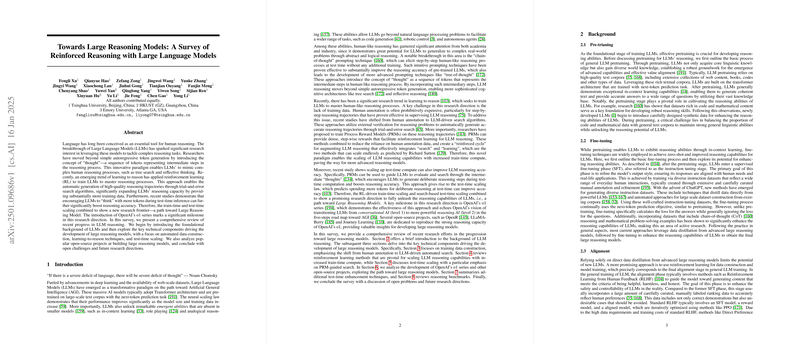LLMs and Reinforced Reasoning: A Structured Examination
The paper "Towards Large Reasoning Models: A Survey of Reinforced Reasoning with LLMs" offers a comprehensive overview of the current advances and challenges in the field of reasoning with LLMs. The authors present a detailed survey of the existing methodologies and innovations that leverage reinforcement learning (RL) to enhance the reasoning capabilities of LLMs. This domain-specific essay seeks to deconstruct the key components of the paper, highlighting its contributions to the field and its implications for future research.
The advent of LLMs has played a pivotal role in accelerating the journey toward AGI. These models, characterized by their extensive parameter space and pre-trained on expansive text corpora, have exhibited emergent abilities such as in-context learning and analogical reasoning. The paper makes a critical observation regarding the utility of 'thoughts' — sequences of tokens that serve as intermediate reasoning steps — in enabling human-like reasoning processes. This approach allows LLMs to emulate complex cognitive tasks akin to tree search and recursive reflection.
Key Innovations
- Reinforcement Learning for Reasoning: The survey underscores an emerging paradigm where reinforcement learning is employed to train LLMs in mastering sophisticated reasoning tasks. This method is particularly significant as it not only automates the generation of high-quality reasoning trajectories but also amplifies the training dataset size through trial-and-error learning. Consequently, this yields an enhanced reasoning capacity and accuracy, extending from train-time scaling to test-time inference.
- Scaling Strategies: The paper elaborates on the interplay between scaling at the train-time and test-time phases. Specifically, the utility of OpenAI’s o1 series is acknowledged as a milestone that reflects advancements in scaling reasoning capabilities. At train-time, RL-driven methods significantly benefit from Process Reward Models (PRMs), which offer nuanced, step-wise feedback rather than outcome-based rewards. For test-time scaling, the paper discusses the beneficial practice of encouraging LLMs to employ more tokens, enhancing the accuracy and reliability of inference processes.
- Data Construction and Annotation: The authors delve into strategies for constructing reasoning datasets, moving from expensive human annotations to more sustainable LLM-driven searches. Automated approaches, including Monte Carlo simulations and MCTS algorithms, are favored for generating effective process supervision data — crucial for training process reward models. Additionally, the self-correcting ability of PRMs facilitates continuous improvement, ensuring that models remain relevant in evolving problem domains.
- Open-Source Contributions: The paper reviews multiple open-source frameworks, such as OpenR and LLaMA-Berry, which mirror the reasoning capabilities of proprietary models like OpenAI’s o1. These implementations emphasize the significance of data-driven iterative training and the application of structured reinforcement learning to cultivate robust reasoning models.
Implications and Future Directions
The insights drawn from this survey have profound implications for the theoretical and practical growth of AI. The iterative training strategies and process supervision outlined offer a tangible pathway for developing LLMs that not only mimic but advance upon human reasoning capabilities. The notion that increased test-time computation can yield performance benefits without altering model parameters introduces a paradigm shift in optimizing LLM efficiency.
Further exploration into test-time scaling laws and zero-shot reasoning paradigms could unveil innovative methodologies to refine the deployment and adaptability of LLMs in real-world applications. The synthesis of knowledge across structured datasets from diverse disciplines could provide a fertile ground for advancing LLM-based AGI prototyping.
This paper serves as a foundational reference for future research aiming to harness the full potential of LLMs in solving complex, real-world problems through reinforced reasoning, while also pushing the boundaries of what is achievable with artificial cognitive architectures. The discourse on the integration of agentic workflows and memory-based reinforcement underscores an open challenge to transition from reasoning models to fully autonomous reasoning agents, marking the next frontier in AI development.
